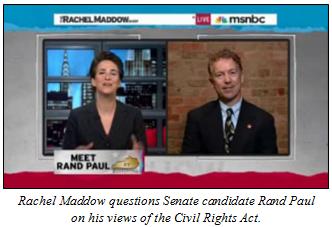By Michael Swartz
With his win earlier this month in Kentucky’s Republican primary for the U.S. Senate seat currently held by the retiring Senator Jim Bunning, Rand Paul termed it a victory for the Tea Party movement. In the May 18 election Paul trounced “establishment” candidate Trey Grayson by a 59% – 35% count, stunning observers with his margin of victory over a candidate backed by Kentucky Senator Mitch McConnell, among others.
For becoming the new darling of the conservative movement, the younger Paul – son of two-time Presidential candidate and libertarian hero Rep. Ron Paul – immediately became the target of the progressives who inhabit the mainstream media. Just as Sarah Palin was bushwhacked by interviews she did with network news personalities Katie Couric and Charlie Gibson during the 2008 campaign, Paul stepped in it just days after winning the primary election with an interview on NPR’s “All Things Considered,” which led to Rachel Maddow browbeating him on her MSNBC show. The line of questioning regarded Paul’s view on civil rights and laws passed a half-century ago.
Obviously the intent of this cross-examination was to play into the media’s template of Tea Partiers as racist hicks far outside the mainstream. You wouldn’t catch those journalists asking a Democrat about his party’s historical opposition to those same civil rights advances dating back to the Civil War, but when they get the opportunity to score points against a rising star of the conservative movement they’re sure to take them.
Perhaps, though, the time has come to make civil rights an issue and ask about the progress we’ve truly made toward a colorblind society. After all, once we elected a President with a multi-racial background it was thought the issue would fade away into a post-racial era – apparently it hasn’t yet sunk in with the media who asked these questions of the Kentucky victor.
Rand Paul brings up a good point about the status of civil rights in America. While the topic of race was the shovel used to try and bury the newly-minted candidate, we could ask the question about a number of other forms of discrimination as well.
One example is the city of Kinston, North Carolina. In 2008 the voters there overwhelmingly supported a change in their municipal elections from partisan to nonpartisan, but they were overruled by the Justice Department based on the Voting Rights Act. Apparently the minority community (which is actually a majority in Kinston) wouldn’t know to vote for the proper candidates if they didn’t have a “D” by their name, according to DOJ logic.
Laws can and do outlive their usefulness. In truth, a business which didn’t provide accommodations for or cater to a portion of their potential clientele would likely find itself closing its doors in short order. As a whole, society is growing more and more tolerant so the prospect of segregated lunch counters is fading into the dustbin of history regardless of whether a law prohibiting the practice exists on the books.
It’s only those who continue to survive on the division of society by race, class, and gender who try to perpetuate the need for outmoded legislation designed to promote a particular party by presenting a facade of tolerance while denying colorblind equality in practice. He may not have made the point in the most eloquent way, but Rand Paul is correct to encourage a hard look at whether equality is better promoted without laws originally designed to keep us equal but evolving into making certain citizens more equal than others.
Michael Swartz used to practice architecture but now is a Maryland-based freelance writer and blogger whose work can be found in a number of outlets, including Liberty Features Syndicate. His e-mail address is lfs.mswartz@gmail.com.


